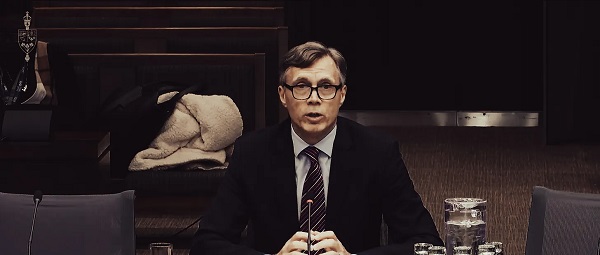Business
What Is It About Politicians and Corporate Bribery Scandals?


 By David Clinton
By David Clinton
Another possible case of influence peddling – this time on behalf of Brookfield Asset Management
On the surface, this is about a strange venture involving Canadian private equity firm Brookfield Asset Management – whose chair until a few weeks ago was Mark Carney. But it seems to me that this particular event is really just one example of a much larger pattern.
In 2016, as Matt Taibbi recently wrote, the U.S. Justice Department settled a claim against the Brazilian construction conglomerate Odebrecht on a case “involving at least $788 million in illegal payments to officials all over the world, as a means of rigging bids and securing contracts.”
As the terms of the settlement were being negotiated, Brookfield made a big purchase from Odebrecht: a 57 percent stake in Rutas de Lima, a private road toll authority in Peru. According to the U.S. Justice Department, Rutas de Lima has demonstrably engaged in corrupt activities.
What’s of interest to us right now is how the 2016 settlement didn’t include – or even mention – Rutas de Lima. That, presumably, would be to Rutas de Lima’s considerable advantage, as their assets would thereby be shielded from the U.S. government. It’s notable that one of the two Justice Department officials who signed off on the settlement had – both before and after his time at Justice – also happened to work for a law firm that represented Brookfield in Washington.
None of which proves any wrongdoing on the part of Brookfield. But it does hint to an association between them and a combination of criminal behavior and political influence peddling. And it turns out that, not only does Brookfield still own Rutas de Lima in 2025, but they’re still actively engaged in legal efforts to recover profitable concessions lost after in the aftermath of the original prosecution.
To be clear, Mark Carney only joined Brookfield in 2020 – long after the Odebrecht settlement – so it’s unlikely any of this directly impacts him.
The thing is, that corporate bribery and government influence peddling are not exactly rare events. In fact, they’re not even rare in Canada.
Remember SNC-Lavalin? That’s the Montreal-based engineering and construction firm that got into some trouble back in 2018 when they were caught bribing (there’s that word again) Libyan officials with upwards of $48 million to secure contracts.
That was a problem. But the Liberal government in Ottawa seemed to have felt that a criminal conviction for SNC-Lavalin in the case would have been a much larger problem. A conviction, after all, would have limited the company’s ability to bid for future federal construction contracts.
During the summer of 2019, as you probably don’t recall, Ethics Commissioner Mario Dion concluded that Prime Minister Trudeau used inappropriate means in an attempt to “circumvent, undermine and ultimately discredit” the decision of the Director of Public Prosecutions. In other words, political heavy hitters went to bat to protect favored corporations from the consequences of an international case of criminal bribery (and fraud).
In the end, SNC-Lavalin Construction Inc. pleaded guilty to just one fraud charge related to Libya, and agreed to a $280 million fine and three years’ probation. Other charges were dropped, avoiding a full trial on the broader allegations. And SNC-Lavalin – since rebranded as AtkinsRéalis – is still happily signing on for many of the largest infrastructure projects in the country.
I suppose government contracts and bribery go together like peanut butter and jam. The Libyan scandal wasn’t even SNC_Lavalin’s first kick at the can. There was, after all, the McGill University Health Centre (MUHC) bribery scandal of 2007 where company executives funneled $22.5 million to MUHC executives to seal the $1.3 billion contract for the new Glen site hospital in Montreal.
But I’m specifically interested in the close personal relationships that seem to inspire powerful government officials to actively subvert the judicial process to cover for such massive crimes. Those seem to represent the greatest threat to our social contract. And, as we’ve just seen from developments in the Brookfield/Rutas de Lima case, they’re aren’t showing signs of disappearing.
Business
Carney’s Bungling of the Tariff Issue Requires a Reset in Canada’s Approach to Trump

Rank and file Americans are best positioned to insist upon a relaxation of Mr. Trump’s tariff policies – that populist base which Mr. Carney neither understands nor respects but whom the President cannot afford to ignore or alienate if he wishes to retain their political support.
By now it is becoming apparent that Mark Carney’s government is seriously bungling Canada’s response to U.S. President Donald Trump’s tariff initiatives. By ill-advisedly imposing counter-tariffs only to withdraw them later, Ottawa temporarily played with “elbows up” – only to learn that, as in hockey, pursuing such a strategy in the absence of a strong offence simply draws penalties and gives the other side a manpower advantage.
As the list of Mr. Carney’s missteps on the tariff file grows – costing Canadians jobs, incomes, and increases in prices – surely it is becoming clear that a fundamental reset is required in Canada’s approach to Mr. Trump and his tariff initiatives if their negative consequences for both Canada and the U.S. are to be overcome.
So what and where is the reset button that could be pushed to redress those initiatives? Who is in the best position to push it, and when is the best opportunity to do so?
That button is not to be found in Washington or on Wall Street, but rather among those to whom Mr. Trump made a promise – time and time again – namely, the American people. “We’re going to get the prices down. We have to get them down. It’s too much. Groceries, cars, everything. We’re going to get the prices down,” he declared repeatedly throughout the 2024 presidential election campaign.
That was the promise. But the current reality is price increases for Americans on food, energy, furniture, and paper products, as well as projected increases in the cost of homes, industrial structures, and public infrastructure as tariffs on steel, aluminum, softwood lumber and timber take their toll. In other words, the reality is not a decrease but an increase in the cost of living for millions of American consumers and voters.
Who then is best positioned to insist upon a relaxation of Mr. Trump’s tariff policies? Not Mr. Carney and his officials, nor even the traditional Washington influencers, but those rank-and-file Americans comprising the massive populist wave that put Mr. Trump in the White House for a second time – that populist base which Mr. Carney neither understands nor respects but whom the President cannot afford to ignore or alienate if he wishes to retain their political support.
So when will be the first real opportunity for Mr. Trump’s core constituency to speak to him effectively – through their votes – about modifying his approach to tariffs? It will be in the months running up to the midterm congressional elections in November, 2026, in which the 435 seats of the House of Representatives and, more crucially, the 35 seats in the US Senate, will be up for election.
Most of those Republican candidates standing for election will want to be pro-Trump to retain hardcore Republican voters, but they will also want to be anti-tariff to secure the support of voters suffering from tariff-induced price increases. How can they be both? By being fully supportive of Mr. Trump’s war on illegal drugs and migrants, bloated bureaucracies, and the mis-management of government finances, while at the same time campaigning as “tariff modifiers”. By asking voters to send them to Washington to support Mr. Trump but to remove the price-increasing-sting of his tariff policies through the negotiation of “reciprocity agreements” with major US trading partners to achieve that objective – just as former president William McKinley, whom Mr. Trump professes to admire, did many years ago.
The election of just a few tariff-moderating Republicans to the U.S. Senate in 2026, to be present when the tariff bill embodying Mr. Trump’s policies eventually gets to that chamber, will do more to improve tariff-disrupting Canada-U.S. trade relations than the ineffectual efforts of those like Mr. Carney who seek to get to Mr. Trump by traditional elite-to-elite negotiating practices.
Getting to Mr. Trump on the tariff issue through his own populist base raises some obvious questions. Which U.S. states, for example, are experiencing the greatest price increases as a result of the tariff wars, and of those, which offer the greatest opportunities to nominate and elect tariff-modifying Republicans to the Senate? Where in the U.S., at the state or national level, are there the beginnings of a grassroots tariff-modification movement, and how might such a movement be encouraged and supported by Canadians as well as Americans.
Americans of course have a vested interest in securing research-informed answers to such questions. But so do Canadians. More on these questions and answers shortly. They are the keys to achieving the desire of the vast majority of rank and file citizens on both sides of the border for a restoration of amicable economic and social relations between our two countries.
Subscribe to Preston’s Substack.
For the full experience, upgrade your subscription.
Business
Labour disputes loom large over Canadian economy

From the Fraser Institute
By Fred McMahon
With labour disputes on the rise, Team Canada faces our greatest economic challenges in decades. It’s a bad look when team members jump the bench for the walk-out/lock-out penalty box—elbows up on the team, not on the ice.
Economic difficulties have escalated in recent years—miserable productivity growth, COVID and its inflation-drenched recovery, the uninvited U.S. trade war, and a government spending spree that left Canada deeply in debt and exacerbated all other difficulties.
Over the same period, labour disputes grew. Hours lost to disputes have been trending down for decades, but up since 2015. For the nine preceding years, the average hours lost annually was 224,000; for the nine years since, it’s been 190,000, but increasing over the years. In 2016, 74,000 hours were lost compared to 362,900 hours in 2023 and 293,600 last year.
Ironically, work stoppages typically occur only if they can wreck havoc on the Canadian economy. They hit sectors where customers and clients have little or no alternative. When customers have choices, they’ll walk away from a shutdown supplier. That encourages workers and businesses to figure out a solution before a strike.
Disputes in transportation and government services are particularly damaging. When Air Canada grounds flights, people and businesses already have tickets and plans. Options are limited and pricey. There is only one Port of Montreal. If it shuts down, there are no other Ports of Montreal. Cargo diversion is, well, limited and pricey. When government employees go on strike, people can’t turn to another government for service.
In 2023 and 2024, Canada suffered 62 transportation such work stoppages, including at the ports of Montreal and Vancouver, Canada’s two largest railways, and the St. Lawrence Seaway.
More disputes are on the way. Canada Post workers recently walked off the job hours after the federal government announced a major move from door-to-door delivery to community mailboxes. In British Columbia, civil servants are on the picket line. Public service unions are preparing to fight efforts to bring federal finances under control. And Air Canada and its flight attendants are now in arbitration after attendants rejected Air Canada’s most recent offer by 99.1 per cent.
As Keith Creel, CEO of Canadian Pacific Kansas City, wrote: “Canada’s message to the world is not one of efficiency, affordability and reliability. Lately, and repeatedly, it’s been the opposite: Disruptions. Delays. Diversions.” This is not a good for Team Canada when Canada needs new investment and entrepreneurship.
Everyone involved in a labour dispute loses. That means Canada losses. Air Canada says its recent strike, three-days long, cost the company $375 million. Employees and customers lose through foregone pay.
More than half a million passengers were directly affected, piling up the losses. Worse is the ripple affect on those not directly affected. When any part of the transportation network is impaired, business and people suffer. The economy is further damaged as investors become skittish about Canadian uncertainty, exacerbating economic difficulties.
Things may get worse. Canada’s economy is shrinking due to the trade war and our own economic mismanagement. That means there’s less stuff to go around. People’s pay on average has to shrink. The economy is not producing enough for everyone to make up “lost wages.” If all wages go up, the economy doesn’t magically start producing more. Instead, money buys less, inflation grows, economic damage intensifies, and there’s even less stuff to go around.
Resentment deepens as workers fight each other over the limited supply of stuff. Those who win make those who lose pay a disproportionate slice of the cost.
Three ways could eliminate or reduce these costs. One is to end unionization in government and essential services. Let the market decide wages. If pay is too low, employees leave for other opportunities, forcing employers to up pay. Another is to incentivize unions to resolve disputes before strikes, for example, by allowing replacement workers. The third is requiring mandatory arbitration, which has an admirable record in Canada of resolving disputes. Legislation should take into account reasonable complaints, whether employers or workers are favoured, and address them.
If Canada’s employers and unions can’t get their act together, only action will avoid dead-loss damage to the Canadian economy, leaving the rest of us as drive-by victims of labour bickering.
-

 National16 hours ago
National16 hours agoCanada’s birth rate plummets to an all-time low
-

 Agriculture1 day ago
Agriculture1 day agoCarney’s nation-building plan forgets food
-

 Fraser Institute1 day ago
Fraser Institute1 day agoAboriginal rights now more constitutionally powerful than any Charter right
-

 Alberta1 day ago
Alberta1 day agoAlberta puts pressure on the federal government’s euthanasia regime
-

 Business17 hours ago
Business17 hours agoElon Musk announces ‘Grokipedia’ project after Tucker Carlson highlights Wikipedia bias
-

 Crime15 hours ago
Crime15 hours agoPierre Poilievre says Christians may be ‘number one’ target of hate violence in Canada
-

 Red Deer1 day ago
Red Deer1 day agoThe City or Red Deer Financial Troubles: The Role of Good Governance, Effective Policies and Key Performance Metrics.
-

 Business2 days ago
Business2 days agoDemocracy Watch Drops a Bomb on Parliament Hill





